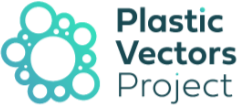The aim of this project is to understand the potential for marine plastic to act as a vector for pathogenic microorganisms and genes for anti-microbial resistance, and to characterise the ability of bacterial communities to degrade plastics and plastic-associated pollutants in the environment
The Plastic vectors project is funded by the Natural Environment Research Council (NERC) under the fourth round of NERC highlight topics
By quantifying the processes of pathogen colonisation and dispersal, together with microbial biodegradation of plastic-associated toxins, the “Plastic-Vectors Project” will address key challenges, and deliver a step-change in our understanding of the human health risks associated with microplastics in coastal environments. By characterising the importance of microplastics as an environmental reservoir and vector for microbial communities, this project will have far-reaching implications for human health and well-being, coastal ecosystem services and economic stability. By understanding the multi-pollutant and multi-scale effects of microplastics, the “Plastic Vectors Project” will deliver a more accurate risk assessment of microplastics by integrating the effects of harmful plastic-associated microbes together with chemical co-pollutants.




